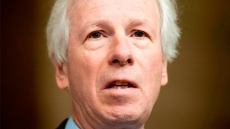TORONTO — A Calgary mother who finds out from a reporter that her son had been killed fighting with an extremist group in Syria is both the subject and voice of a new TV documentary slated to air this week.
The documentary, "A Jihadi in the Family," traces the painful transition Christianne Boudreau makes from oblivious mother of a troubled teen to international activist as she struggles to understand what happened to her child.
In the process, Boudreau discovers kindred spirits in the scores of other grief-stricken mothers slammed by the winds of religious extremism and brutal geopolitics against which they can barely sputter.
"The stories of our children are all the same," Boudreau says. "And even though it's a different country, we're still going through the exact same challenges."
Boudreau's 22-year-old son, Damian Clairmont, a convert to Islam, died in early 2014. He had left Canada in November 2012 to fight in Syria. Unbeknownst to Boudreau, Canadian intelligence agents had been watching him for two years before he disappeared. She thought he had gone to Egypt to study Arabic.
"Why didn't I see the signs? Why didn't I stop him?" she asks. "These questions haunt me every day of my life."
Boudreau's quest for answers morphs into a personal then public crusade against the forces of extremism that have lured thousands of western youth to the bloodied battlegrounds of Iraq and Syria. Families of all faiths and backgrounds have fallen victim to the sinister charm of fighting and dying for what their loved ones believe is a God-sanctioned cause.
The intimate look at their private hell is a strength of the documentary, written and directed by filmmaker Eileen Thalenberg with Toronto-based Stormy Nights Productions, produced by Gail McIntyre and Maryse Rouillard, and slated to air on the CBC TV program "Firsthand" on Thursday.
At the same time, however, those seeking a better understanding of what drives young people to give up the relative comfort of their lives in Canada or Western Europe to go fight might be disappointed. Attempts at an explanation seem to end at a few passing references to disconnected or alienated youth.

"The one common thing we have is that they are all everyday people," Amarnath Amarasingam of the University of Waterloo says of the western jihadists. "We need to understand the broader cause or the broader drivers of these things."
Regardless of what motivates their children, Boudreau and other like her find common cause in a group called Mothers for Life devoted to putting out a contra-message: That the sophisticated siren call of jihad is a sure-fire path to self-destruction.
In France, Boudreau seeks answers from Mourad Benchellali, 34, who was once duped into going to a jihadist training camp in Afghanistan and ended up in Guantanamo Bay. Now a high-profile anti-radicalization activist, Benchellali was inexplicably barred last fall from Canada, where he was set to deliver his message both publicly and privately to law enforcement.
As German counter-radicalization expert Daniel Koehle tells Boudreau, efforts by security forces to crack down on Islamic terrorists often play straight into the hands of extremist recruiters.
Today, Mothers for Life exists in 10 countries. Fathers — otherwise conspicuous by their absence in the documentary — and siblings, also victims when loved ones sign on with extremist groups, are members. For Boudreau, however, the anti-jihadist cause has taken over much of her life. She moved to France earlier this year to be closer to her parents and family support, and, apparently, because she felt branded in Canada.

"People say I'm the mother of a terrorist," she says. "I wonder if I'll ever lose that stigma."





